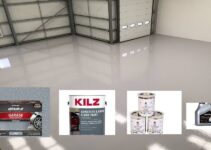Staining Concrete Garage Floor
When it comes to enhancing the appearance and durability of your garage, staining the concrete floor is a game-changer.
Not only does it provide a fresh, stylish look, but it also protects the floor from wear and tear.
In this comprehensive guide, I’ll give you a heads-up for staining concrete garage floors, covering everything from different types of stains and surface preparation to application techniques, sealing, maintenance, and more.
By the end, you’ll have all the knowledge you need to transform your garage into a space you’ll be proud of.
What is Concrete Staining?
Concrete staining is a process that involves applying color to a concrete surface to enhance its appearance. It’s a versatile method that works wonders on garage floors.
Whether you’re looking for a sleek, polished finish or a more natural, rustic look, there’s a concrete stain that suits your preferences.
Benefits of Staining Concrete Garage Floors
Staining garage floor offers numerous advantages. It not only transforms a dull and drab space into an eye-catching one but also provides long-lasting benefits:
- Enhanced Aesthetics: Concrete garage floor stain allows you to choose from an array of colors, patterns, and designs. This opens up endless possibilities for customization.
- Durability: Stained concrete is more resilient to daily wear and tear compared to plain, untreated concrete. It’s resistant to stains, chemicals, and abrasions.
- Low Maintenance: Once properly sealed, stained concrete is easy to maintain. Regular cleaning is a breeze, and it doesn’t require frequent reapplication.
- Cost-Effective: Staining is an economical way to enhance your garage’s look, as it eliminates the need for expensive flooring materials like tiles or epoxy.
- Environmental Friendliness: Unlike many other flooring options, concrete staining minimizes waste since it works with your existing concrete substrate.
Types of Concrete Stains
Before embarking on your concrete garage floor staining project, you must understand the two primary types of concrete stains: acid-based stains and water-based stains.
Acid-Based Stains
These stains react chemically with the concrete to produce a variegated, marbled appearance. They are known for their rich, translucent colors and unique patterns. Acid stains are ideal for those who seek a distinctive, high-end look.
Water-Based Stains
Water-based stains are more versatile and come in a wide range of colors. They penetrate the concrete, creating a more consistent, opaque finish. If you prefer a solid color or want to achieve a specific shade, water-based stains are your best bet.
Surface Preparation
To ensure a successful concrete garage floor staining project, thorough surface preparation is crucial. This stage sets the foundation for a beautiful and long-lasting finish.
Cleaning the Concrete Floor
Begin by removing all dirt, debris, and any existing coatings from the garage floor. A clean surface ensures the stain adheres properly and creates an even finish.
Removing Old Paint or Coatings
If your garage floor has old paint or coatings, it’s essential to strip them off before staining. This can be done using chemical paint strippers or mechanical methods, depending on the type of coating.
Repairing Cracks and Holes
Inspect the floor for cracks and holes, as these imperfections will show through the stain. Repair them with a suitable concrete patching compound and allow it to dry before proceeding.
Etching the Concrete (For Acid Stains Only)
If you’ve chosen an acid-based stain, etching is necessary. It opens up the pores of the concrete to allow the stain to penetrate deeply. Be sure to follow safety precautions when working with acid-based products.
Staining the Concrete Floor
Now comes the exciting part—staining the concrete garage floor. Here’s what you need to know about this critical step.
Choosing the Right Application Method
The method you choose depends on the type of stain you’re using. For acid stains, you’ll typically apply them with a sprayer or brush, while water-based stains can be applied using a roller, brush, or sprayer.
Applying the Concrete Stain
Begin by applying the stain evenly, following the manufacturer’s instructions. It’s essential to maintain a consistent application to achieve the desired color and finish.
Removing Excess Stain
After applying the stain, excess must be removed to prevent uneven coloring. This can be done with a mop or absorbent towels. Be sure to do this while the stain is still wet.
Allowing the Stain to Dry
Patience is key. Let the stained concrete floor dry completely before proceeding to the sealing stage. This can take up to 24 hours, depending on environmental conditions.
Sealing the Concrete Floor
Sealing your stained concrete garage floor is the final step, and it’s a crucial one. The right sealer protects the stain and enhances its longevity.
Choosing the Right Concrete Sealer
Selecting the appropriate sealer is vital. You can choose between acrylic sealers, epoxy sealers, or polyurethane sealers. Each type has its unique qualities, so it’s important to consider your garage’s specific needs.
Applying the Concrete Sealer
Apply the sealer following the manufacturer’s recommendations. It typically involves using a roller or sprayer. Ensure even coverage, and allow the sealer to dry thoroughly.
Maintaining the Sealed Concrete Floor
To keep your stained and sealed concrete garage floor looking its best, regular maintenance is essential. This includes routine cleaning with a pH-balanced cleaner and resealing every few years to maintain its protective properties.
Additional Considerations
Staining Concrete Walls
If you want to create a cohesive look in your garage, consider staining the walls as well. This can be done using the same stain you used for the floor, creating a seamless and stylish finish.
Staining Outdoor Concrete
Concrete staining isn’t limited to your garage’s interior. You can also use the same staining techniques on your outdoor concrete surfaces, such as patios and walkways, to tie your outdoor and indoor spaces together.
Hiring a Professional Concrete Stainer
While many DIY enthusiasts successfully tackle concrete garage floor staining projects, hiring a professional is an excellent choice if you lack the time, experience, or confidence. Professionals bring expertise and efficiency to the table, ensuring a flawless finish.
Frequently Asked Questions
Can I Stain a New Concrete Floor?
Yes, you can stain a new concrete floor, but you should wait for it to cure for at least 28 days before staining. Proper surface preparation is still crucial.
How Long Does It Take to Stain a Concrete Floor?
The time required depends on various factors, including the size of your garage, the type of stain used, and environmental conditions. On average, it can take a few days to complete the entire process.
How Much Does It Cost to Stain a Concrete Floor?
The cost varies depending on the stain type, labor costs, and your location. DIY projects are more budget-friendly, while professional services can be more expensive but offer expertise and convenience.
Can I Stain Over Existing Paint or Coatings?
Staining over existing paint or coatings is possible, but it requires proper surface preparation to ensure adhesion. Stripping or sanding the existing coating is often necessary.
How Can I Protect My Stained Concrete Floor from Oil and Stains?
To protect your stained concrete garage floor from oil and stains, it’s crucial to promptly clean up any spills. Applying a high-quality concrete sealer with stain resistance properties enhances protection.
Conclusion
Staining a concrete garage floor is an excellent investment that offers aesthetic appeal, durability, and easy maintenance.
Whether you choose to tackle it as a DIY project or hire a professional, the results are sure to leave you with a beautiful and functional space.
So, go ahead and unlock the potential of your garage by staining the concrete floor, and let your creative ideas flow, just like the stain itself, to transform your space into a true masterpiece of functionality and style. Staining concrete garage floor – the ultimate choice for a remarkable transformation.


